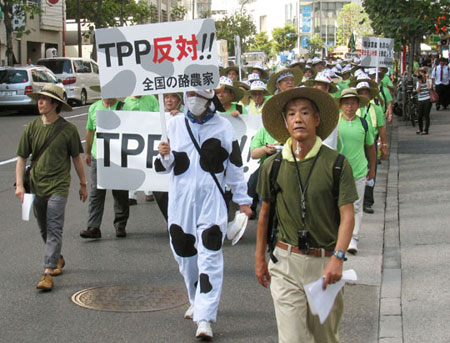Cutting red tape Japan’s focus in preparation for TPP

Bloomberg | 24 August 2016
Cutting red tape Japan’s focus in preparation for TPP
By Toshio Aritake
Japan’s government will focus on cutting red tape to accommodate foreign businesses wanting access to the Japanese market as it ramps up efforts to have a 12-nation Asia-Pacific trade pact ratified, a Cabinet Office official said.
Prime Minister Shinzo Abe is bent on submitting the bills to approve the Trans-Pacific Partnership (TPP) to the next Diet (parliament) session before the U.S. presidential election Nov. 8, the official said Aug. 23.
Regulatory and structural reforms, or doing away with unnecessary government regulations, is one of Abe’s “Abenomics three arrows” economic policy, but it has been criticized as static or even backpedaling.
The prime minister is gearing up to revamp the government Council for Regulatory Reform by late September, when his ruling Liberal Democratic Party plans to resubmit the TPP bills to the Diet (152 ITD, 8/8/16).
Abe is instructing aides to appoint more global- and business-oriented people to the council, rather than the academics and business retirees that dominated the previous council, which dissolved in late June, a Cabinet Office official who spoke on the condition of anonymity told Bloomberg BNA.
In addition, the LDP Aug. 23 is preparing to appoint a new chairman of the House of Representatives TPP Commission. An LDP Secretariat official said the party plans to tap Ryu Shionoya, former chairman of the LDP General Council, to chair the TPP Commission. Shionoya would replace Koya Nishikawa, who served in the role in the previous Diet session, the official said.
Council’s Role With TPP
To date, the council has been working on recommendations primarily related to domestic matters, such as work-life balance, National Health Insurance and a lifetime work policy. Abe wants to bridge the role of the council with the TPP by reviewing and doing away with unnecessary government regulations and simplifying those that are necessary for foreign businesses that want to gain a foothold in, and export goods and services to, Japan, the official said.
Japanese government panels typically spend six to nine months before delivering reports to the government; therefore, the new council to be formed by late September is likely to hand its report to the prime minister in the first half of 2017.
The new council would take up such issues as agriculture, transportation, telecommunications and information technology, as well as self-regulation, community and regional revitalization, a carryover of the previous council, the official said.
Why Bother?
Not everyone in the Diet is motivated to ratify the TPP.
Democratic Party Secretary General Yukio Edano Aug. 20 said in a speech in Saitama, near Tokyo, that the prospects of the U.S. Congress ratifying the TPP are “considerably slim, so it doesn’t make a lot of sense for Japan to rush ratification,” a party official confirmed.
Instead, Edano said Japan should wait for the U.S. to make concessions in the TPP agreement areas where Japan is disadvantaged probably referring to the agricultural area, the official said.
While U.S. lawmakers say they want concessions on the trade pact’s intellectual property protections for biologic medications and investor-state dispute protections for tobacco companies, among others, some Japanese lawmakers say the TPP doesn’t do enough to defend five “sensitive” agricultural products from tariff liberalization (76 ITD, 4/20/16).





